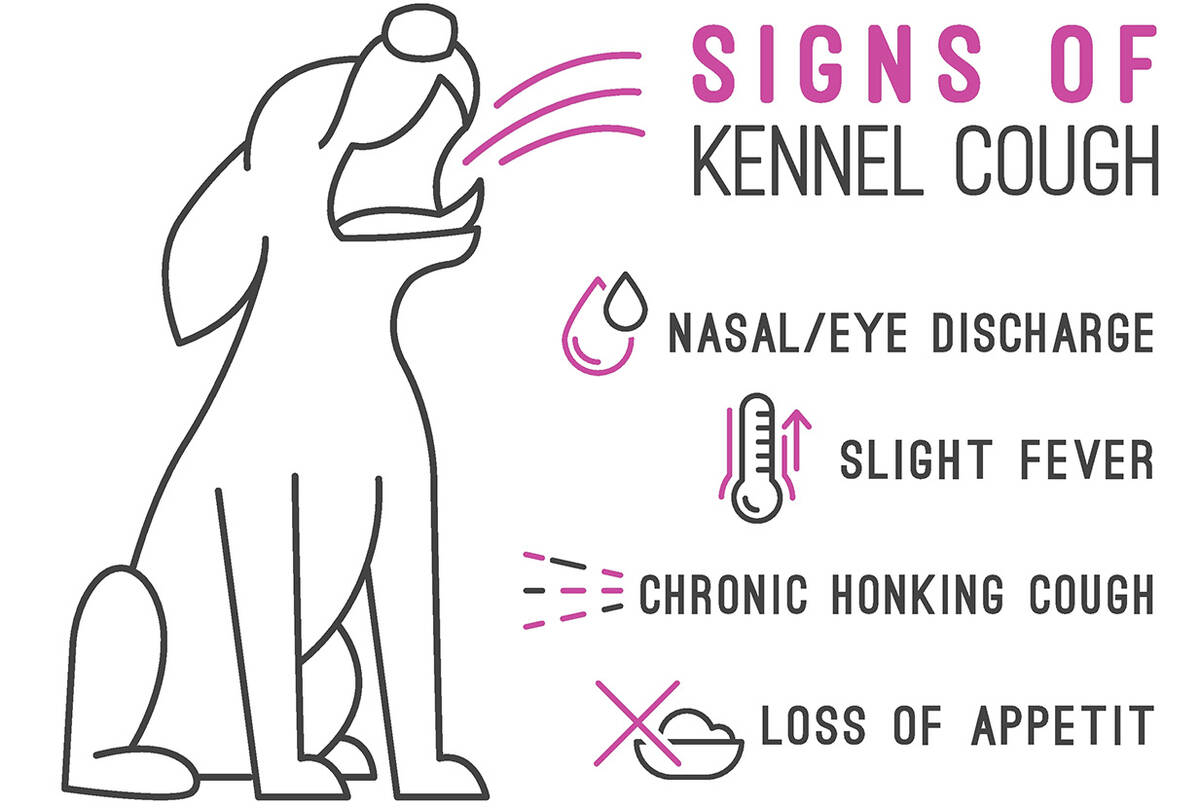Nevada dog owners advised to prepare for spreading ‘mystery’ disease
A mysterious dog disease that has been spreading across the country appears to have affected dogs in Nevada.
The Review-Journal has received reports from local dog owners who had pets infected by the disease.
“You may have noticed in the news reports across the country a ‘mystery illness’ that has been affecting dogs resulting in coughing, sneezing, eye or nose discharge and lethargy,” a recent email from Boca Park Animal Hospital to clients who own dogs stated.
Some reports say the disease resembles kennel cough, but some deaths have been reported.
“Canine infectious respiratory disease complex (CIRDC), more familiarly known as ‘kennel cough,’ is a highly contagious illness affecting the respiratory tract in dogs,” states a post on the American Veterinary Medical Association website. “All breeds and ages are susceptible. As the name ‘kennel cough’ suggests, dogs at particular risk are those exposed to settings where multiple dogs are typically gathered or housed, such as kennels, shelters, and daycare facilities.”
The Boca Park email offered proactive steps for dog owners:
— Ensure vaccinations are up-to-date: Regularly update your dog’s vaccinations, including those for canine influenza, Bordetella, and parainfluenza. This is your pet’s best protection against potential infections and significantly contributes to their overall health.
— Watch for symptoms: Be vigilant for symptoms such as coughing, sneezing, nasal and/or eye discharge, and lethargy. If your dog exhibits any of these signs, contact your veterinarian promptly.
— Reduce contact with unknown and sick dogs: Minimize contact with large groups of unknown dogs, as increased exposure raises the risk of encountering infectious agents. Additionally, steer clear of visibly sick dogs by observing signs such as coughing, runny nose, or runny eyes.
— Keep sick dogs at home: If your dog is unwell, keep them at home and seek veterinary care promptly. This not only protects other dogs from potential exposure but also ensures your pet receives the necessary attention.
— Avoid communal water bowls: Steer clear of communal water bowls shared by multiple dogs. This reduces the risk of transmission through shared resources and helps maintain a healthy environment.
Signs of CIRDC
The classic sign of CIRDC is a frequent, honking cough that comes on suddenly, according to the AVMA. This cough has also been described as gagging or retching, and it can involve froth that looks like vomit. Coughing generally worsens with activity or exercise, which can irritate the airways.
Even so, not all dogs with CIRDC will have a cough. Other common signs include sneezing and a runny nose or eyes and lethargy.
In most cases of CIRDC, the illness is mild and dogs fully recover within 7 to 10 days. However, depending on the infecting organism(s) and the dog’s ability to fight them, some dogs may develop more severe signs like lethargy, decreased appetite, fever, productive cough, and rapid or labored breathing, which can signal that bacteria have infected the lungs (bacterial pneumonia) and immediate veterinary attention is needed.
How CIRDC is spread
Most dogs with CIRDC are contagious before they start showing signs. Because of this, the disease can be difficult to control. It can spread rapidly, leading to outbreaks—particularly in multiple-dog settings. Some CIRDC-associated organisms are also quite hardy, able to survive in the environment for weeks, making controlling spread of infection even more challenging.
Dogs can catch CIRDC through close or direct contact (e.g., licking or nuzzling) with infected dogs, breathing in cough or sneeze droplets from infected dogs, and exposure to droplet-contaminated items such as toys, bedding, people’s hands, or water bowls. The risk of infection is especially high when dogs are in close contact with other infected dogs for long periods of time.
CIRDC treatment
There is no special drug for dogs with CIRDC. The treatment approach depends on how sick the dog is. Most mildly affected dogs will quickly make a full recovery with basic supportive care aimed at avoiding situations that promote coughing and irritate airways. This means encouraging the dog to rest and avoiding excitement and neck leashes. Dogs with more severe illness may benefit from nonsteroidal anti-inflammatory medications (to reduce fever and inflammation) and fluids (to treat dehydration).
Contact Marvin Clemons at mclemons@reviewjournal.com.



















